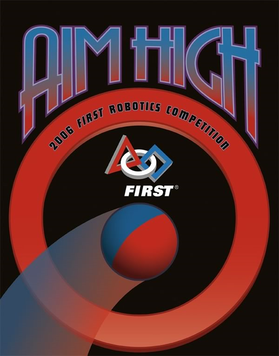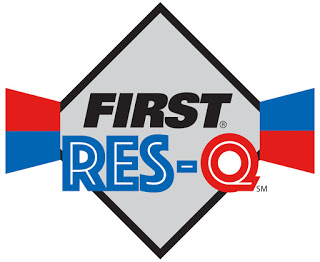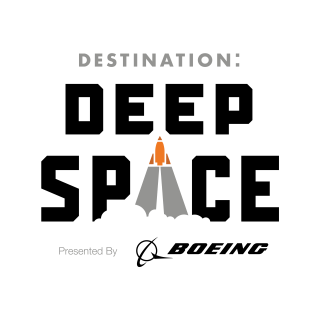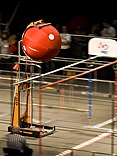
FIRST Frenzy: Raising the Bar was the 2004 game for the FIRST Robotics Competition. The game included elements from previous years' games, including mobile goals, "capping" goals with large inflatable balls, and others. In Raising the Bar, teams could score by having their human player score purple balls in any of the goals, capping the goals with a multiplier ball, or hanging their robot suspended from the 10-foot (3.0 m) high 'chin up bar'. In the qualifying matches, Teams competed in 2-member randomly generated alliances. In the elimination rounds, 3-member alliances competed against each other with one team sitting out each match. The alliance that won two matches advanced in the tournament.

Aim High was the 2006 game for the FIRST Robotics Competition. The competition involved teams competing to gain points by delivering balls into goals and positioning their robots in certain positions on the playing field. The teams took it in turn to provide defense and attack.

FIRST Tech Challenge (FTC), formerly known as FIRST Vex Challenge, is a robotics competition for students in grades 7–12 to compete head to head, by designing, building, and programming a robot to compete in an alliance format against other teams. FIRST Tech Challenge is one of the six major robotics programs organized by FIRST, which its other five programs include FIRST Lego League Discover, FIRST Lego League Explore, FIRST Lego League Challenge, FIRST Robotics Competition, and FIRST Global Challenge.

Hangin'-A-Round was the name of the robotics contest at the 2006-2007 FIRST Vex Challenge (FVC). The contest involved building a robot from a kit that could attain a higher score than the opposition by placing the softballs into the colored goals, possessing the “atlas ball”, and by being parked on the platform or hanging from the bar.

In the 2007-2008 FIRST Tech Challenge robot competition, Quad Quandary is the first challenge theme replacing the former FIRST Vex Challenge, with similar general rules regarding the specifications of the robot and the game play. Unlike the previous challenge, Hangin'-A-Round, Quad Quandary makes use of small rings and movable goal posts.

Half-Pipe Hustle was the first official FIRST Vex Challenge (FVC) game, taking place in 2005–2006. In this challenge, robotics teams built robots from the Vex design kit to compete in competitions across the United States and in other nations, in matches consisting of a 45-second autonomous period, followed by a 2-minute driver control period in which the robots are controlled by team drivers using remote controls.

Lunacy is the game for the 2009 FIRST Robotics Competition. Announced on January 3, 2009, the name and some of the features of the game honor the 40th anniversary of the first human mission to the Moon. It is FRC's 18th game. This is the first FRC competition to use the cRIO Mobile Device Controller control system from National Instruments. The driver station introduced for 2009 was the Kwikbyte DS, which was replaced in 2010 by the Classmate PC.
Breakaway is the game for the 2010 FIRST Robotics Competition, announced on January 9, 2010. Robots direct soccer balls into goals, traverse "bumps" in the field, suspend themselves and each other on towers, and/or go through a tunnel located in the center of the field.

For Inspiration and Recognition of Science and Technology (FIRST) is an international youth organization that operates the FIRST Robotics Competition, FIRST LEGO League Challenge, FIRST LEGO League Explore, FIRST LEGO League Discover, and FIRST Tech Challenge competitions. Founded by Dean Kamen and Woodie Flowers in 1989, its expressed goal is to develop ways to inspire students in engineering and technology fields. Its philosophy is expressed by the organization as Coopertition and Gracious Professionalism. FIRST also operates FIRST Place, a research facility at FIRST Headquarters in Manchester, New Hampshire, where it holds educational programs and day camps for students and teachers.
Get Over It! is the robotics competition event for the 2010-11 FIRST Tech Challenge. Two teams compete to score points by depositing colored batons in various types of goals. The name of the game refers to the many obstacles that traverse the middle of the field, which include a mountain, two bridges, and two ramps.

Logo Motion is the 2011 FIRST Robotics Competition game. Playing pieces are inner tubes shaped like the components of the FIRST logo. The primary objective of the game is to place them on racks to gain points. In the endgame, robots deploy smaller robots ("minibots") to climb a tower. Minibots must be made from the FIRST Tech Challenge kit of parts. The game celebrates the 20th season of the FRC and is also meant to commemorate the artist Jack Kamen, who designed the original FIRST logo.

Bowled Over!, released on 10 September 2011, is the 2011–12 robotics competition for FIRST Tech Challenge. Two alliances compete to score racquetballs into alliance-colored scoring goals. The name refers to two bowling balls on the field used for scoring points.

Ring It Up!, released on 8 September 2012, was the 2012–2013 robotics competition for FIRST Tech Challenge. In the competition, two alliances, each consisting of two teams, competed to score plastic rings on a set of pegs aligned in a three-dimensional tic-tac-toe board. Ring It Up! is the eighth FTC challenge. More than 2400 teams competed worldwide, surpassing the number of competitors in the previous year's Bowled Over! challenge.

Block Party!, released on September 7, 2013, is the 2013–2014 robotics competition for FIRST Tech Challenge. In the competition, two alliances, each consisting of two teams, compete to score blocks in plastic crates atop alliance-colored pendulums. Block Party! is the ninth FTC challenge.

FIRST Res-Q, released on September 8, 2015, is the 2015–2016 robotics competition for FIRST Tech Challenge. In the competition, two alliances, each consisting of two teams, compete to climb a mountain and score debris in alliance specific goals. FIRST Res-Q is the eleventh FTC challenge game.
VEX Robotics is a robotics program for elementary through university students and a subset of Innovation First International. The VEX Robotics competitions and programs are managed by the Robotics Education & Competition Foundation (RECF). In April 2018, VEX Robotics Competition was named the largest robotics competition in the world by Guinness World Records.

FIRST Steamworks, stylized as FIRST STEAMworks, was the FIRST Robotics Competition game for the 2017 season. As in past games, two alliances of three individual teams and their robots compete on a field to score "match" point to win the game and ranking points to advance to playoff rounds. The game has a steampunk theme and teams are required to shoot wiffle balls which represent fuel into a simulated boiler which transfers the generated steam into an airship in the middle of the field. Each alliance has one airship, which they pressurize with steam from the boiler and load with plastic gears from the field. At the end of the match, robots can climb and hang on team-supplied ropes attached to the airship for additional points.

FIRST Power Up, stylised as FIRST POWER UP, is the FIRST Robotics Competition game for the 2018 season. It involves two alliances of three teams each, with each team controlling a robot and performing specific tasks on a field to score points. The game has a retro 8-bit theme and teams are required to place milk crates, or "power cubes", on large balancing scales to tip the scale and gain ownership. Alliances can also trade power cubes for power ups, giving them a temporary advantage in a match. At the end of the match, robots can climb the tower attached to the centre balancing scale using a rung attached to the tower, giving them additional points.

Destination: Deep Space, stylized as DESTINATION: DEEP SPACE and officially known as Destination: Deep Space Presented By The Boeing Company, is the FIRST Robotics Competition game for the 2019 season. It involves two alliances of three teams each, with each team controlling a robot and performing specific tasks on a field to score points. The game centers around an outer space theme involving two alliances consisting of three teams each competing to place poly-carbonate hatch panels and orange rubber balls or "cargo" on rockets and cargo ships before returning to their HAB platform to climb at the end of the match.

Infinite Recharge is the FIRST Robotics Competition (FRC) game for the 2020 season. The season is in partnership with Lucasfilm as part of its Star Wars: Force for Change initiative.


















